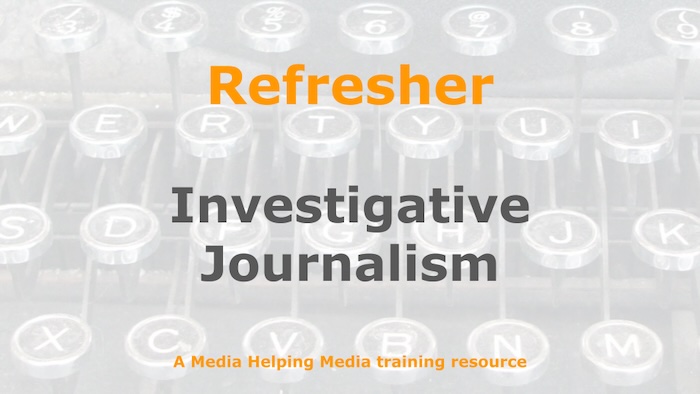 This intensive day-long course aims to cultivate the crucial “investigative mindset” required for producing original, in-depth investigative journalism.
This intensive day-long course aims to cultivate the crucial “investigative mindset” required for producing original, in-depth investigative journalism.
Students will review the fundamental principles, advanced techniques, and ethical responsibilities involved in modern investigative reporting, from initial concept to final presentation.
The refresher revisits the content covered in the six-week module ‘Investigative Journalism’ which you are free to download and adapt for your own purposes.
We recommend that trainers circulate the recommended reading resources listed below and encourage participants to read them before attending this refresher.
Learning objectives
Upon completion of this course, participants will be able to:
- Formulate a robust investigative hypothesis and source plan.
- Apply techniques for accessing, compiling, and analysing official documents and public data.
- Master strategies for interviewing reluctant or hostile subjects while adhering to ethical guidelines.
- Understand the role, opportunities, and limitations of artificial intelligence (AI) in data analysis for investigations.
- Navigate legal and ethical challenges and avoid common pitfalls in high-stakes reporting.
Programme schedule
This schedule is structured as four 90-minute core sessions, integrating lectures, activities, and pre- or post-session reading.
Session 1: Mindset, sources, and the dossier (9:00 – 10:30)
- Topics covered: Defining investigative journalism, its purpose, and the development of the crucial investigative mindset. Strategies for identifying, cultivating, and protecting sources. The practical methods for compiling a comprehensive investigative dossier.
- Activity: Role-playing: approaches to initial source contact and starting a digital dossier.
- Recommended reading:
(10:30 – 10:45) – Break
Session 2: Documents and data investigation (10:45 – 12:15)
- Topics covered: Accessing and analysing public records and official documents. Understanding bureaucratic language and identifying discrepancies. The use of legal tools such as Freedom of Information (FOI) requests.
- Activity: Workshop: analysing sample official documents (e.g., company reports or council minutes) and drafting a simple FOI request.
- Recommended reading:
(12:15 – 1:15) – Lunch
Session 3: Advanced interviewing and technology (1:15 – 2:45)
- Topics covered: Strategies for interviewing reluctant or hostile subjects and covering sensitive issues like corruption. Verification and corroboration techniques. The transformative role of AI and other technology (e.g., data analysis, mapping) in modern investigations, along with their ethical limitations.
- Activity: Demonstration of relevant AI tools for research and data analysis, followed by a discussion on AI ethics.
- Recommended reading:
(2:45 – 3:00) – Break
Session 4: Ethics, legal risks, and presentation (3:00 – 4:30)
- Topics covered: Navigating legal challenges (defamation, privacy) and managing high-stakes ethical dilemmas. Structuring and presenting investigative findings effectively. Review of common pitfalls and best practices for avoiding them.
- Activity: Discussion of complex ethical dilemmas and analysis of case studies involving legal challenges.
- Recommended reading:
Concluding summary and discussion (4.30 – 5.00)
The skills refined in this course—from meticulous source development to the responsible use of new technologies—are essential for holding power to account. By focusing on rigour, integrity, and ethical decision-making, participants ensure their work maintains credibility and delivers significant public impact.
We suggest you end the session with a group discussion to find out what participants have learnt from the refresher.








